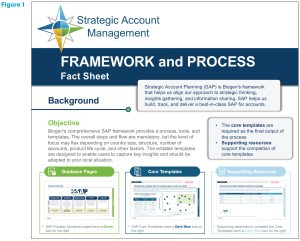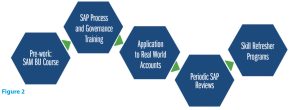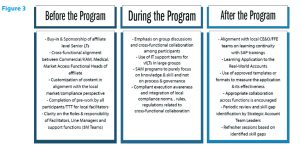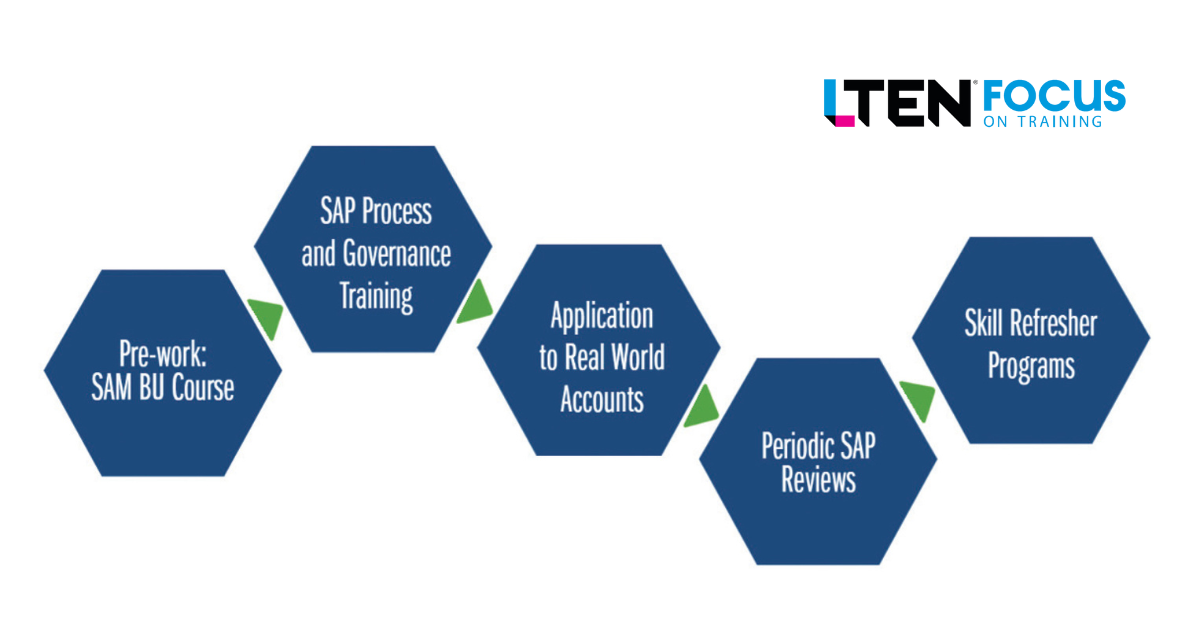
Cover Story – By Abhijit Hemant Kumtakar, Veronica Marcucci, Drew Oppelt and Peter Zhang
Effective execution requires different mindsets, skills and objectives
For years, the sole decision-maker within the healthcare system was seen as the individual clinician writing a drug prescription or the surgeon performing a surgery. As a result, individual clinicians were at the core of life sciences sales and marketing efforts.
Over the past few years, however, this model has shifted dramatically. The rise of organized healthcare institutions has led to the shift in prescribing power from the hands of the individual clinicians to decision-making units comprised of groups, committees or the network of medical, social, administrative, payer and patient representatives.
This transition has also compelled the pharmaceutical industry to adopt strategic account management (SAM) as its primary business strategy (Figure 1).
Growing Influence
At Biogen, we also realized the growing influence of these decision-making units, also known as “organized customers.”
We have adopted a strategy focused on providing unique offering and value through an orchestrated, cross-functional, go-to-market model designed specifically to address the needs and engagement preferences of a defined segment of large, complex and strategically important systems and groups. The team developed a comprehensive framework for strategic account planning (SAP) in conjunction with the separate governance guide and a platform for SAP documentation and knowledge management.
Having a comprehensive process, governance and IT platform, however, is not adequate for the successful implementation of strategic account management. Effective execution of SAM requires different mindsets, skills and objectives.
Therefore, the Biogen Intercontinental Commercial Learning Team developed a foundational skillset program. It complements the process trainings as well as develops the required mindset and behaviors among the members of cross-functional teams to work collaboratively as a strategic account management team and project a One Biogen approach while serving providers and patients.
Business Challenges and Opportunity
At the onset of the project to develop the skillset program, we realized that countries within Biogen’s Intercontinental Region are at different stages of maturity in terms of SAP application. Key issues affected the field performance and execution practices, like:
- Imbalance in the call frequency in high value segments.
- Overall interaction rates.
- Non-alignment of segmentation with global standards.
- Gaps in reporting the interaction and events in the system.
Even though the process and governance training was implemented, due to employee turnover and at times a silo approach between various functions in the field, we were not able to achieve the full potential of the SAP framework.
Considering the strategic importance of new product launches in the Intercontinental Region, it was imperative for us to develop a solution to overcome these challenges.
Initial Steps
One advantage we had during the initial stages of this project was the presence of a comprehensive strategic account planning framework developed by our customer engagement and operations team. The skillset module was built around the SAP framework to maintain the continuity and ease of application in the real-world scenarios.
This module was then called the Strategic Account Management (SAM) Skillset Program. For instructional design, we used successive approximation model approach.
In the first phase, the focus was on gathering information about:
- How the leadership and respective functions working in the strategic accounts in different countries in the region view the current SAP process.
- What kind of skillsets they feel are critical for them to effectively execute the SAP.
- What are their expectations from the skill development workshop?
Based on the insights generated from this preparation phase, we started developing the iterative design phase, where a prototype of the skillset program was built and shared with the leads from cross-functional teams of sales, medical affairs, customer engagement and operations, and value and access for feedback.
Compliant execution was critical as integration of compliance norms and applicable rules and regulations is a priority to guide appropriate cross-functional information sharing and customer interactions. Therefore, the inputs from these critical stakeholders helped us to make additional and necessary design changes in the module to ensure that the program is suitable for the cross-functional target audience of field commercial, medical and market access teams.
Additionally, these inputs also supported the alignment of the skillset program with the existing workstreams like SAP process and governance training, Veeva customer relationship management (CRM) and value and access processes.
The outcome of this phase was a comprehensive foundational skillset prototype, which focused on every step of strategic account planning from identification and prioritization of strategic accounts to execution and performance tracking. While developing this skillset module, we also had to keep in mind the different types of business challenges and opportunities that were identified earlier.
Throughout the prototype design phase, the commercial learning team’s focus was to ensure that the skillset modules should have multipurpose application. This focus ensures the same resources can be used for addressing the skill gaps in the strategic account planning process and is useful for orienting new hires on Biogen’s SAP approach.
Most importantly, they should be able to support the new product launch excellence initiatives and be utilized as a pull-through resource for skill reinforcement.
Development and Roll-Out
During the workshop development and roll-out, two potential issues were identified from our stakeholders. The first one was related to ensuring adherence to compliant cross-functional information sharing and working, especially between commercial and medical functions, and the other one was related to the duration of the learning pathway.
- Compliance norms related to cross-functional engagement and information sharing: To address the first issue, we engaged with the country-level legal and compliance teams to ensure the integration of consistent guidance through the SAP/SAM initiative with respect to the legal and compliance norms applicable to the respective region/country. We had to ensure that the internal training session should primarily focus on brainstorming and enhancing the awareness of how each function can contribute to the One Biogen approach while ensuring appropriate
delineation between roles and responsibilities in accordance with rules, regulations and compliance and execution norms. To do this, we utilized the guidelines from legal and compliance teams and during each of the SAM sessions. - Duration of the learning pathway: As the COVID restrictions were gradually lifted and accounts and institutions allowed in-person calls, the customer facing time of our target audience from the field commercial, medical and market access teams was very valuable. Our original plan was to conduct the face-to-face trainings to facilitate the live interactions between cross-functional teams to foster the idea exchange and better awareness of one another’s strengths for effective cross-functional collaboration in the field. However, considering the field reality, we decided to modify our approach and adopt the 70:20:10 model.
During the third phase of instructional design, we modified our learning resources into self-paced elearning modules via technologies including SimpleShow and Synthesia and uploaded them on our internal LMS platform, Biogen University. The purpose of these elearning modules was to help learners to get the conceptual understanding of the required knowledge and skillset at their own pace. The 10% of the learning was thus covered through elearning coursework.
The next step in this process was to ensure learning through interaction with others. We developed interactive instructor-led training that used the application exercises where participants can apply their conceptual understanding of the elearning modules on a fictitious account case study through cross-functional group exercises.
Finally, a major part of 70% learning was through on-the-job application, where participants apply the learnings from the first two phases on their real-world accounts. The application is periodically reviewed with the help of SAP templates and key performance indicators. During the periodic review, the learning application as well as the skill gaps are identified based on the feedback of the line managers and the SAP performance review of an individual.
We also maintained a modular roll-out approach, to reflect the different levels of development stage our affiliate countries were experiencing from a SAP implementation perspective.
For the first roll-out of this initiative, we chose one of our affiliate countries in the Gulf region, which had started its business operation a year ago and had a strong need for such foundational programs on SAM skillset as well as SAP process and governance training. Figure 2 shows the approach that was adopted.
Initial Findings and Iterations for Future Workshops
Our first implementation in the Gulf region was a great success. The cross-functional collaboration between regional and local 3M (Medical, Marketing and Market Access) teams was crucial for the smooth roll-out and positive feedback from the learners.
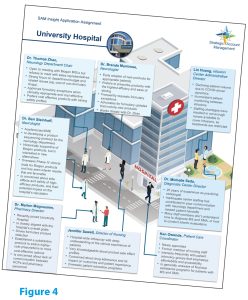 As we continue our roll-out, it’s critical that execution within legal and compliance norms for medical and commercial interaction remain a focus. Due to the diverse geography and ecosystem of our intercontinental region, we are sensitive to the potential need for adaptation and adherence to varying compliance norms in each country.
As we continue our roll-out, it’s critical that execution within legal and compliance norms for medical and commercial interaction remain a focus. Due to the diverse geography and ecosystem of our intercontinental region, we are sensitive to the potential need for adaptation and adherence to varying compliance norms in each country.
Figure 3 shows some of the critical success factors from our initial experiences of rolling out the SAM skillset program.
Next Steps
We have developed multilevel evaluations to measure the effectiveness of these trainings and the SAP initiative like Qstream surveys, observation reports and feedback from the functional leads, SAP implementation tracking in the CRM system and periodic SAP review meetings.
Strategic account management is a journey, not a one-time project. Our journey of SAM at Biogen is set for new adventures and milestones and is proving to be an important tool to ensure our team members are confident and capable to successfully march on this journey. So far, we have launched this program in three countries (UAE, China and Saudi Arabia). The next steps include increasing implementation of the program across further regions including Latin America and Asia Pacific.



 The SAM skillset initiative was led, and this article written, by Abhijit Kumtakar, associate director, MS leaming, Biogen; and Peter Zhang, learning partner, ALZ Learning. The authors recognize and value the support of their global commercial learning leadership team, content development and learning technology partners and cross-functional leads and field team members of all affiliates in Biogen. Email the authors through drew.oppett@biogen.com.
The SAM skillset initiative was led, and this article written, by Abhijit Kumtakar, associate director, MS leaming, Biogen; and Peter Zhang, learning partner, ALZ Learning. The authors recognize and value the support of their global commercial learning leadership team, content development and learning technology partners and cross-functional leads and field team members of all affiliates in Biogen. Email the authors through drew.oppett@biogen.com.

